Late summer viewing: Spies, Killers and Terrorists

If I was inclined to make excuses for my less than exemplary viewing choices, I might blame the higher-than-usual temperatures this summer. Although I live in a basement suite in an older building – naturally cooler than the apartments above me – I don’t have air conditioning, so when the temperatures remain high for weeks on end, it does heat up in here. Which means, apart from a certain level of physical discomfort, I haven’t been sleeping well. And being tired, I more often then not shy away from more serious and demanding films. Slouching in my chair with a fan blowing on me, I instead watch more action movies and thrillers than anything else. Not, of course, that genre films can’t also exhibit some depth … but it’s the visceral thrills that keep me from falling asleep in front of the TV.
Red Sparrow (Francis Lawrence, 2018)
Francis Lawrence, who started out as a music video director, is more about eye candy than substance, which is why his comic book adaptation Constantine (2005) is enjoyable while his version of Richard Matheson’s dystopian sci-fi/horror novel I Am Legend (2007) is a dud. I didn’t see his Water For Elephants (2011), so Red Sparrow (2018) is the first film by him I’ve seen set in something like the real world. I also didn’t see his Hunger Games sequels (I think I managed about five minutes of Catching Fire before I gave up), but he obviously developed some kind of rapport with Jennifer Lawrence (no relation) and cast her as the lead in this slick but somewhat seedy espionage movie.

Lawrence (the actress) is the main reason for watching as once again she commits fully to her role – this time as Dominika, a young ballet star whose career is cut short by scheming members of the corps. Faced with a bleak life in economically deficient Russia, threatened with being put out on the street with her terminally ill mother because their apartment is provided by the ballet company she can no longer dance for, she is pressured by her uncle to become an agent trained to use her sexuality to entrap foreign officials – a “sparrow”. This plot device has recently gained some credibility with the revelations of Maria Butina and her infiltration and manipulation of the NRA and Republican Party.
The story follows her training – a process of ego-destruction and dehumanization in service of the State – and involvement with a CIA agent. Essentially a prostitute for Putin, she suffers humiliation and brutality … but turns out to be smarter than her masters, playing her own game, and eventually destroying her uncle, who has obvious incestuous intentions towards her. The most successful aspect of the movie is the way it takes the standard attitude towards women in old-school spy movies (“Bond girls”) and stands it on its head; the men in the story attempt to use Dominika in that way, but she is self-empowered, using their own smug sense of superiority to destroy them. (20th Century Fox Blu-ray: deleted scenes, multiple featurettes, and a commentary from director Lawrence.)
*
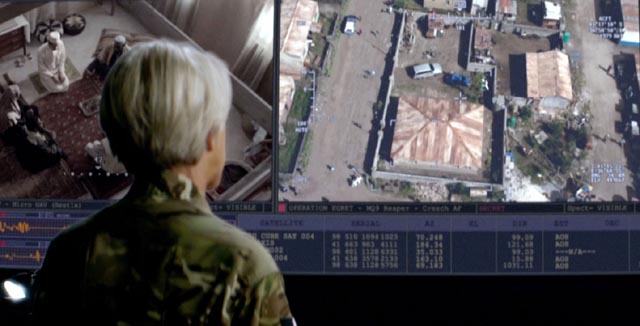
Eye in the Sky (Gavin Hood, 2015)
I haven’t seen Gavin Hood’s earlier films (including the Oscar-winning Tsotsi [2005]) but the two later ones I’ve watched – X-Men Origins: Wolverine (2009) and Ender’s Game (2013) – indicate a proficient but impersonal commercial talent. (I actually liked the latter more than my friends who were fans of the Orson Scott Card source novel, which I haven’t read.) That efficiency serves Hood well in Eye in the Sky (2015), a very tightly written (by Guy Hibbert) thriller which attempts to encapsulate all the moral and technical issues involved in a long-distance “war” against terrorism.
When three high-value Al-Shabaab figures are tracked to Nairobi, Kenya, a multi-national network of forces kicks into gear, initially with the intention of seizing one of the three in particular, an English woman converted to Islam and now (implausibly?) a senior figure in the terrorist network. The operation is being led by a British colonel, Katherine Powell (Helen Mirren), who has to deal not only with what’s happening on the ground in Nairobi, but also with a committee of British politicians, a U.S. unit based in Nevada which controls the drone hovering above the city and observing events (the “eye” of the title), and a high-tech unit in Hawaii which is in charge of a sophisticated facial recognition system being used to identify the people on the ground. Eventually, the British foreign minister (in Asia for an arms market and suffering from food poisoning), the U.S. Secretary of State (in China at a ping-pong tournament), and a White House official are brought in because the military are now under direct political control as the operation is being guided from the homeland rather than in the field.
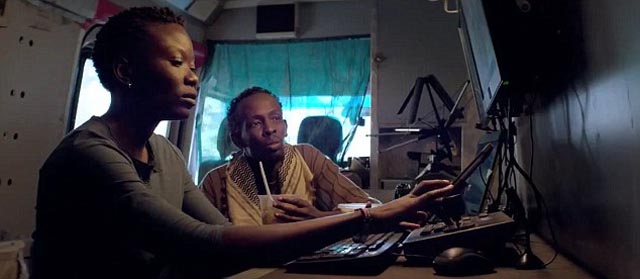
The script carefully layers all the elements, beginning with a young Muslim girl whose father is secretly educating her despite the potentially deadly opposition of the fanatics who run the neighbourhood and a Somali working on the scene as an undercover agent for the British (using miniature surveillance drones to see inside the terrorist compound); to Powell in her control bunker; to her superior officer in committee with various ministers who balk at making military decisions which may have adverse political consequences; to the drone crew in Nevada and the briefly glimpsed higher government officials for whom distance makes life-and-death decisions easy.
Once it becomes clear that the gathering of Al-Shabaab leaders involves preparing two new recruits – one British, one American – to carry out suicide bombings, the mission for Powell changes from capture to kill, while the politicians balk at the risks of “collateral damage”, primarily the presence at a roadside stall just outside the compound of the young girl selling bread baked by her mother. As time runs out, the question of whether to allow the suicide bombers to carry out their mission in order not to risk harming the girl, or conversely to risk killing the girl in order to prevent a far larger slaughter, becomes virtually impossible to answer with any kind of clarity.
This is the movie’s strength, it’s refusal to make a simple statement of what’s right or wrong … and yet, in the end, whether intended or not, it does seem to justify the program of long-distance drone assassinations despite the moral ambiguities. Although all the British and American characters end up morally compromised, the action is deemed necessary for a larger good. The final word is given to Powell’s superior, General Benson (Alan Rickman in his final role), who snaps at a disgusted under-secretary that appalling moral compromises are an unavoidable part of war. (eOne Films Blu-ray: multiple featurettes and interviews.)
*
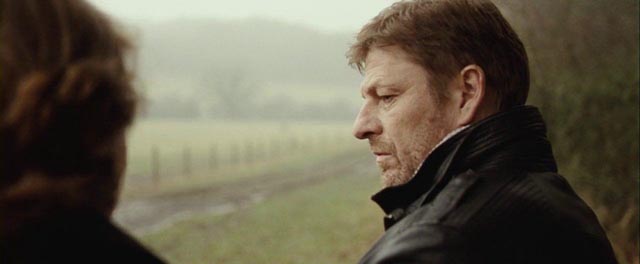
Cleanskin (Hadi Hajaig, 2012)
Written and directed by Hadi Hajaig, Cleanskin (2012) also deals with terrorism and the moral murkiness in which both sides operate. It has a good cast: Sean Bean as an agent nearing burn-out, Charlotte Rampling and James Fox as his handlers, Abhin Galeya as a British-born Muslim who has been radicalized by a manipulative cleric after bitterly ending his relationship with a fellow student (Tuppence Middleton). The film toys with serious issues – homegrown suicide-bombers groomed by malevolent religious leaders who despise the corruption of western democracies – but plays them through a fairly standard espionage story.
Working undercover, Ewan (Bean) loses track of a stash of C4 and is tasked with finding the explosive, and the potential yet currently unidentified terrorist cell which has stolen it. There are flashbacks to the experiences which have led to Ash (Galeya) reaching the point where he’s willing to sacrifice himself for the cause, a process which actually elicits some sympathy for him. Ewan, on the other hand, is a hard and brutal man who kills quite easily even though he’s losing sight of the legitimacy of the state he works for. In fact, as he tries to identify the unknown Ash (a “cleanskin” in his agency’s parlance), he discovers that he himself is being used and, apparently, targeted for elimination. A power struggle among the higher-ups in his agency makes him both a useful tool and a liability to be disposed of once he’s served the immediate purpose. This plot line appears to support the moral condemnation of British society which the cleric uses as a justification for blowing things up. (eOne Blu-ray: brief making-of featurette.)
*
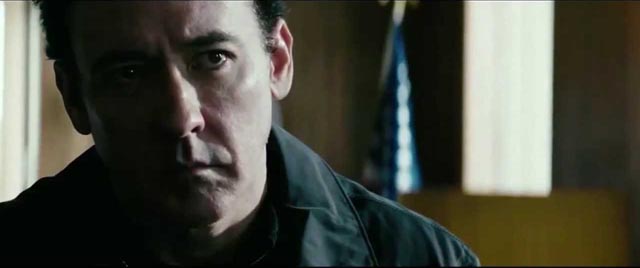
The Numbers Station (Kasper Barfoed, 2013)
A burned-out agency killer is also at the centre of Danish director Kasper Barfoed’s The Numbers Station (2013). But here there’s no pretension to deeper themes; it’s a tightly constructed action movie whose sole purpose is to place a pair of characters in a dangerous, claustrophobic situation and watch them figure out how to survive. Emerson Kent (John Cusack) is a government assassin who has had his fill of killing. The last straw is a job-gone-wrong in which a teenage girl sees him kill her father; unable to clean things up by killing her as well, he has to watch as his boss/handler (Liam Cunningham) does the job for him. His failure to act gets him a suspension and a new assignment – as security at a clandestine “numbers station” located in a bunker beneath a decommissioned airfield in the English countryside. He’s paired with Katherine (Malin Akerman), a woman whose job it is to broadcast messages in code – she doesn’t know what they mean or who they’re aimed at, but Emerson knows they’re instructions to field agents around the world.
When the pair arrive for their shift one day, they discover that the station has been compromised, the couple from the previous shift now dead and a series of unauthorized messages sent. While Emerson holds off a deadly mercenary team, it’s up to Katherine to decipher the sent messages and then encode and broadcast counter-instructions to agents who have been ordered to assassinate a group of high-level officials on our side (including, naturally, Emerson’s old boss). Because the whole station is compromised, Emerson is ordered to clean up by eliminating Katherine as well … but flashbacks to the girl he could neither kill nor save determine him to protect her from both the mercenaries and his own agency.
Although Cusack is here in dour mode, which doesn’t draw at all on his innate charm as an actor, the film is an effective thriller, with the added benefit that there is no attempt to generate anything like a romance between Emerson and Katherine; she’s too busy figuring out the codes and he’s too busy trying to assuage his conscience by saving her. (VVS Films Blu-ray: making-of featurette, brief interview with John Cusack.)
*
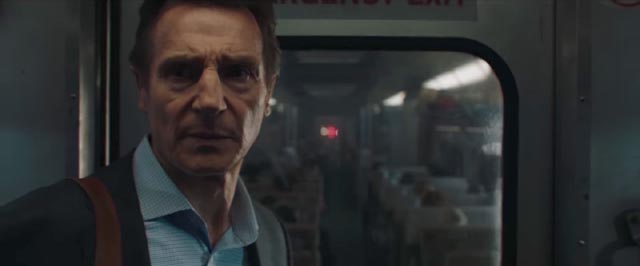
The Commuter (Jaume Collet-Serra, 2018)
While Red Sparrow is glossy pulp, and Eye in the Sky and Cleanskin situate their thriller elements in a recognizably “real” world, and The Numbers Station adheres to a straightforward and narratively plausible genre template, Jaume Collet-Serra’s The Commuter (2018) belongs to a long line of gimmicky thrillers in which plausibility is simply not an issue and what matters is the mechanics of a plot within which the protagonist is trapped. Liam Neeson seems to have made a late career commitment to this particular genre, beginning with the Taken trilogy. The Commuter is his fourth collaboration with Collet-Serra, and the third to revel in such plot absurdities. (The fourth, Run All Night [2015] is a more straightforward mob story.) In Unknown (2011), Neeson wakes from a coma after an accident in Paris and discovers that someone has taken over his life – a life which turns out to have been a fake covering his real identity. In Non-Stop (2014), he’s an air marshall trapped on a plane by sinister forces which promise to kill the passengers one by one unless their demands are met.
And now in The Commuter, he’s an insurance salesman who, on the day he loses his job, is approached by a mysterious woman (Vera Farmiga) on his way home by commuter train; she pitches him a hypothetical idea – would you sacrifice a stranger if it meant gaining wealth – only to discover it’s not so hypothetical after all: finding the money stashed in a washroom signals his engagement in the “game”. Now he must find a particular passenger, whose identity is unknown, and identify him or her to facilitate their death. To prove they’re serious, the unseen villains kill a fellow passenger and threaten the salesman’s family.
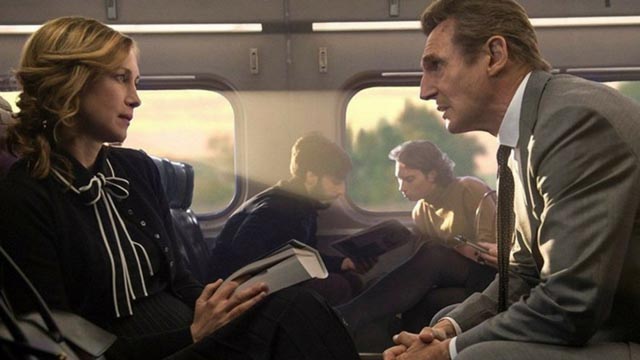
It turns out that he’s been targeted for specific reasons – his firing was arranged to put him in financial distress; his pre-salesman job was as a cop, so he has the necessary investigative skills to find the anonymous target (who turns out to be the witness to a murder which certain people want to cover up). There’s a lot of frantic running around, intermittent fights (and deaths), but not much in the way of moral conflict. The salesman was tricked into finding the money and has little intention of carrying out his mission; he just has to figure out a way of saving his family while also protecting the witness. It’s all pretty weightless, dramatically speaking, but it does keep busy for just over an hour-and-a-half.
Collet-Serra started out with some promise – the underrated House of Wax (2005) and the creepy Orphan (2009) – but his work in the past decade exhibits a kind of impersonal proficiency rather than any individual directorial identity. (VVS Films Blu-ray: a couple of short featurettes.)
*
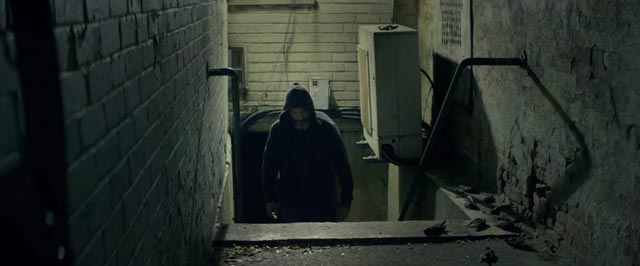
You Were Never Really Here (Lynne Ramsay, 2017)
Lynne Ramsay, however, has directorial identity to spare. Two points about her most recent film, You Were Never Really Here (2017): it’s surprising to see this distinctively individual director take on what is essentially a generic thriller, and it’s not surprising that she attempts (through style alone) to deconstruct the form. There’s been a subgenre of movies about damaged men getting violent to save young women or underage girls from sexual slavery going back at least to Taxi Driver (1976), with recent examples in Antoine Fuqua’s The Equalizer and Stephen Knight’s Redemption (aka Hummingbird, 2013).
In Ramsay’s hands (she wrote the script, based on a story by Jonathan Ames), the film is rife with parodic elements, but they’re played dramatically straight – which paradoxically makes them seem even more parodic. I honestly had trouble figuring out the tone she intended. Her narrative style, however, is familiar from her previous films, approaching the story obliquely; despite the violent content, the film gives an impression of stillness as we mostly see the spaces of inactivity between the bursts of action, and when we do see action it is more likely than not taking place at a distance, observed objectively through surveillance cameras.
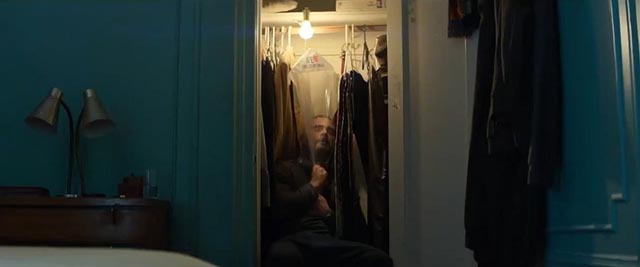
Joe (Joaquin Phoenix) is a damaged man – in flashbacks we see the abuse he suffered as a child with a violent father, as well as incidents he experienced later as a soldier (in either Afghanistan or Iraq) – who lives in his childhood home in New York with his ailing mother (Judith Roberts, Henry’s beautiful neighbour in Eraserhead). Joe is now a hitman, working for a handler who gets him assignments rescuing girls from sexual bondage. His latest job is to find the young daughter of a state senator, which leads to a high class pedophile brothel which he invades and more or less destroys – killing security guards and customers before finding the girl. In one of those tonally cryptic decisions, Joe’s weapon of choice is a hammer which he uses to beat people to a bloody death.
Joe remains sullen and inarticulate as he goes about his business, offering little resistance when a pair of cops come to take the girl away from him; being fatalistic when someone kills his handler and their go-between, and finally his mother, shot in the head in her bed. But he nonetheless tracks the pedophile chain to the top of the social and political heap … though it turns out the girl by now doesn’t need rescuing as she’s become a hardened killer herself …
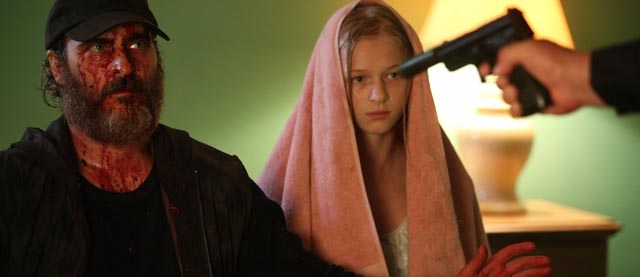
I really can’t see what appealed to Ramsay in this story. The narrative could have been built around any number of B-grade action stars without losing much and, although she approaches the material with her usual cool, detached style, she doesn’t bring anything fresh as an outsider to the depiction of a corrupt and violent America – as she did to some degree in her previous feature, We Need to Talk About Kevin (2011). Unless you consider the ending, with Joe finding some kind of redemption by allowing the girl to take charge of his life as they head out on the road together, to be saying something about the need for depressed and violent men to rediscover their inner child …
I was left puzzled at the final fade out, having been deprived of the more visceral pleasures of a straightforward thriller without being given something deeper and more meaningful in their stead.
(Elevation Pictures Blu-ray: although listed on the cover and given its own menu option, the “featurette” From Book to Film runs only 1:03, adding a few soundbites from Ramsay and original author Ames to clips from the film.)
Comments
None of these are in my stacks of DVDs to watch but I tend to pick up thrillers less than other types of films. The more straight up a thriller is, or if it’s got a more serious terrorist story, the less likely I’m going to watch it.
I’d prefer to watch somehting more over the top, like the Taken series or The Expendables. That series is fun. Stuff that is less close to reality is more my bag. I’m also more likely to want to watch an older thriller, I just watched Panic In The Streets the other day and enjoyed the hell out of that. First film role for Jack Palance. Glad I picked that up.
I enjoy both kinds of thrillers – “realistic” and over-the-top. I liked the first two Taken movies, Fast Five and Expendables 2, but I get more than momentary excitement out of something like The Spy Who Came in from the Cold. The other day I watched The China Syndrome for the first time since I saw it in a theatre in 1979 and it holds up really well … and made me realize how much things have changed. Weird that the urgency about nuclear energy development expressed by the movie seems to have evaporated despite the subsequent disasters at Three Mile Island, Chernobyl and Fukushima. It made me almost nostalgic for the sense of engagement that fueled ’70s paranoia.
I watched The Commuter. I thought it was a terrible waste of Vera Farmiga, who I think is really good. It was also a bit too much like Source Code, without the cool SF element.
On the other hand, ALL of the others are on my watch list, particularly You Were Never Here. I have a soft spot for Joaquin Phoenix since Inherent Vice.
Agree about Vera Farmiga; she’s much more interesting than Neeson. (Also probably why you were reminded of Source Code, as she’s the officer in charge of the project.